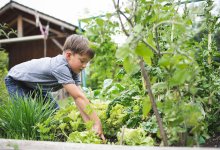Science
Explore and share tips, strategies, and resources for helping students develop in science.
Setting Up Choice Boards in Math and Science
Letting high school students choose how they take notes in math and science classes can get them to engage more deeply with the content.264Exploring Before Explaining Sparks Learning
New elementary science teachers can build student engagement and enhance learning by using the explore-before-explain approach.Why Students Should Write in All Subjects
Writing improves learning by consolidating information in long-term memory, researchers explain. Plus, five engaging writing activities to use in all subjects.19.7kAssessing Learning Based on Skills
When student skills are the driving force behind proficiency scales, assessments provide a road map to success.583Teaching the Concept of Equity Through Gardening
Plants can illustrate how different people need different things to be nourished—and how equality and equity differ.9.7kEncouraging Collaboration With a Scientists Circle
This routine creates an equitable structure for sharing out ideas, questions, or evidence in science class—and helps ensure every student takes part.1.7kI Let Students Choose Their Grading Criteria, and Here’s How It Went
When students have a say in the assessment of their work, they find more enjoyment in demonstrating their knowledge.698Designing Science Inquiry: Claim + Evidence + Reasoning = Explanation
The Claim, Evidence, Reasoning framework is a scaffolded way to teach the scientific method.32.1kHow to Use the 5E Model in Your Science Classroom
An inquiry-focused method gives students a way to connect scientific ideas to their experiences and apply their learning.4kReinventing AP Courses With Rigorous Project-Based Learning
A new study shows that when implemented well, AP courses built around project-based learning can raise test scores for all students, including those in traditionally underserved demographics.4.7kAdapting Science Lessons for Distance Learning
With a little creativity, students can still take part in science experiments and discussions while learning at home.5.4kMeet ‘ChemBot’: How to Design a Personalized GPT Tutor
The PROMPT framework helps teachers construct scaffolded GPT prompts to build their own AI classroom assistants.340Shifting From Linear Learning to a Spiral Approach in Science
Repeated exposure to important concepts helps students retain more information and think deeper about the material they’re studying.685A Framework for Lessons on Sustainability
Teachers can use this framework to guide students to develop deep and enduring knowledge on environmental topics.216A Year of No Tests
Removing summative assessments from instructional practice can make class more interesting, engaging, and stress free for students.2.3k













